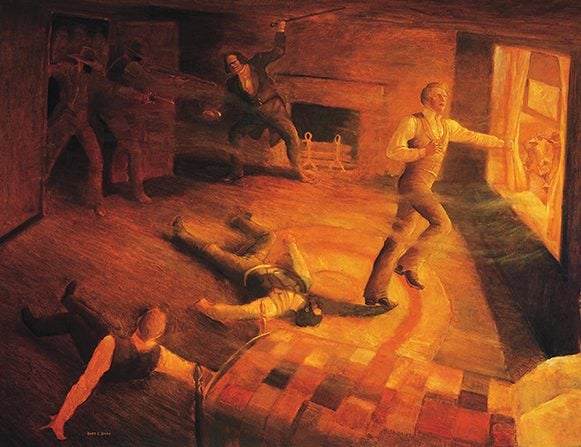
(LDS Media Library)
I would feel terrible if I let this day pass without noting that it’s the anniversary of the assassination of the Prophet Joseph Smith in Carthage, Illinois, by an anti-Mormon mob. He was murdered on 27 June 1844.
I’ve never believed it necessary or advisable to treat him as some kind of flawless, superhuman demigod. But I’ve been bothered recently by an opposite and equally false tendency — which I find not only among critics of the Church but among some active Latter-day Saints — to overemphasize his flaws, both real and (mostly) perceived.
I would absolutely hate it were my life to be pawed over the way the lives of many public figures are. Fortunately, I’m sufficiently obscure and insignificant that it will never happen. While I’m not guilty of most of the things that certain of my more implacable critics allege — cold-hearted viciousness and even sadism, for instance, and cynical mendacity — I have my share of flaws of which I’m very aware, and I hope that most people will exercise the charity toward me that I try to exercise toward other people. Regardless of how good he or she may be, nobody’s character can withstand hostile scrutiny from a person who is absolutely determined to blacken it.
So, too, with Joseph. He was, I’m convinced, a good, decent, kind, and honest man. (For years, I’ve recommended Mark McConkie’s excellent book Remembering Joseph: Personal Recollections of Those Who Know the Prophet Joseph Smith. And now I’m recommending it again.) I want to speak up against the tendency to find fault with him.
And, for this entry, I want to stand with Elder Jeffrey R. Holland:
Not everything in life is so black and white, but the authenticity of the Book of Mormon and its keystone role in our religion seem to be exactly that. Either Joseph Smith was the prophet he said he was, a prophet who, after seeing the Father and the Son, later beheld the angel Moroni, repeatedly heard counsel from Moroni’s lips, and eventually received at his hands a set of ancient gold plates that he then translated by the gift and power of God, or else he did not. And if he did not, he would not be entitled to the reputation of New England folk hero or well-meaning young man or writer of remarkable fiction. No, nor would he be entitled to be considered a great teacher, a quintessential American religious leader, or the creator of great devotional literature. If he had lied about the coming forth of the Book of Mormon, he would certainly be none of these. . . . If Joseph Smith did not translate the Book of Mormon as a work of ancient origin, then I would move heaven and earth to meet the “real” nineteenth-century author. After one hundred and fifty years, no one can come up with a credible alternative candidate, but if the book were false, surely there must be someone willing to step forward — if no one else, at least the descendants of the “real” author — claiming credit for such a remarkable document and all that has transpired in its wake. After all, a writer that can move millions can make millions. Shouldn’t someone have come forth then or now to cashier the whole phenomenon?
Posted from Atlanta, Georgia












